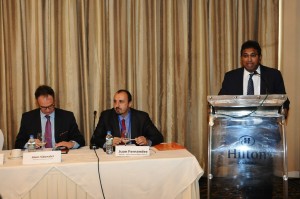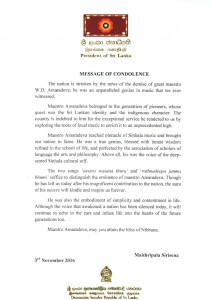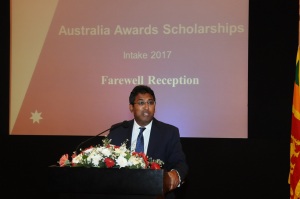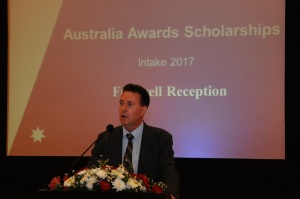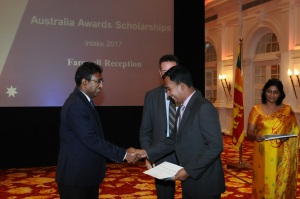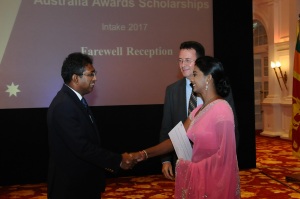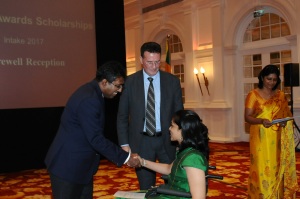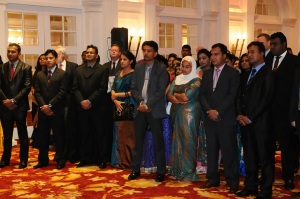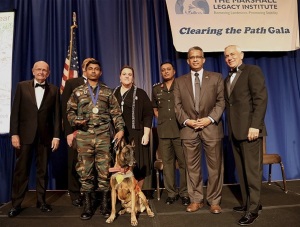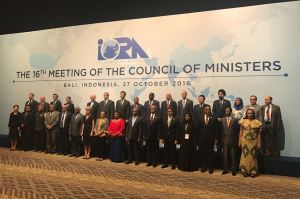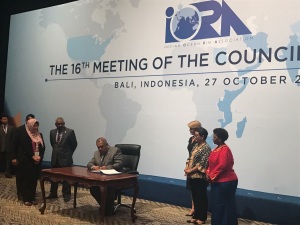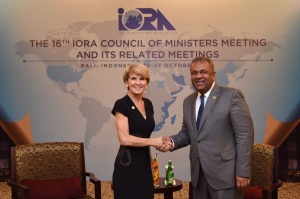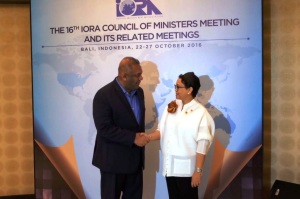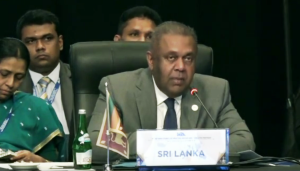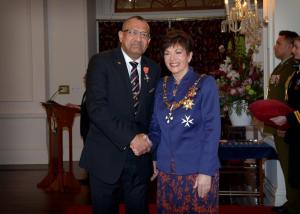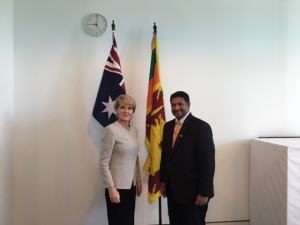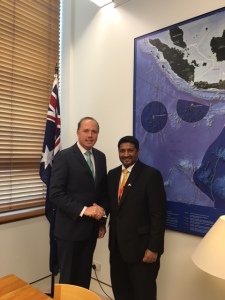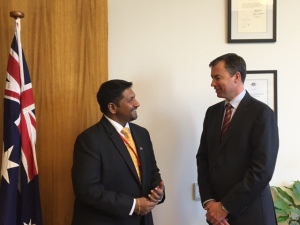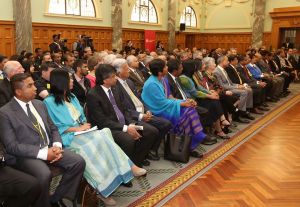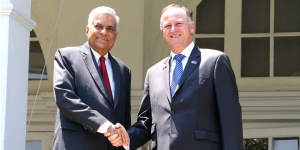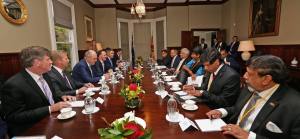


Remarks by Deputy Foreign Minister Dr. Harsha de Silva at Regional Consultations on Transitional Justice in Asia-Pacific
November 14, 2016
Remarks by Hon. Dr. Harsha de Silva. Deputy Minister of Foreign Affairs
Regional Consultations on Transitional Justice in Asia-Pacific
Hilton Colombo, 9 November 2016
UN Special Rapporteur on the promotion of truth, justice, reparation and guarantees of non-recurrence, Mr. Pablo de Greiff,
Acting UN Resident Coordinator Mr. Alain Sibenaler,
Officials from the Office of the High Commissioner for Human Rights,
Ladies and Gentlemen,
It is a pleasure to be here with you this morning, and I extend to all of you, a very warm welcome to Sri Lanka.
I understand that this meeting brings together State representatives, representatives of transitional justice mechanisms, national human rights institutions, NGOs, victims groups, UN officials, and representatives of regional organisations from the Asia-Pacific region to discuss and share experiences on transitional justice processes in the region.
I was informed that in accordance with the mandate given by the Human Rights Council to the Special Rapporteur, he was requested by the Council to gather relevant information on national situations, including on normative frameworks, national practices and experiences; identify, exchange and promote good practices and lessons learned; and recommend ways and means to improve and strengthen the promotion of truth, justice, reparation and guarantees of non-recurrence.
Accordingly, regional consultations have so far been held for the Middle East and North Africa, Latin America and the Caribbean, Africa, and Europe and North America. The region of the Asia-Pacific is the last on the list.
I feel that we are fortunate that by accident or by design, the consultations for the Asia-Pacific was kept to be done last, giving us this wonderful opportunity to welcome not only Mr. Pablo de Greiff, but all of you, to Sri Lanka.
As you all know, since the election of President Maithripala Sirisena in a historical Presidential election last January, Sri Lanka has embarked on a process of reconciliation. The two main political parties in Sri Lanka – the Sri Lanka Freedom Party led by President Sirisena and the United National Party led by Prime Minister Ranil Wickremesinghe have come together to forge a Government of National Unity. This is a step that is unprecedented in our nation’s history. In the words of President Sirisena in his inaugural address to Parliament following the General Election last August, this was a necessary step to obtain the bipartisan consensus that is required to face the important challenges before our nation, which include reconciliation and peacebuilding.
Therefore, Ladies and Genetlemen, this is an important moment in our history. We have acknowledged and recognised the need for reconciliation and the important contribution that transitional justice can make to this process of healing. Sri Lanka’s co-sponsorship of Resolution 30/1 titled ‘Promoting reconciliation, accountability and human rights in Sri Lanka’ is a manifestation of our strong commitment to this process.
Several initial steps in this long journey that we have embarked upon have been taken already. This includes the setting up, through an Act of Parliament, an Office on Missing Persons which is a component of the truth-seeking process. The legislation for this was enacted in August and the procedural steps for its establishment including the nomination of members by the Constitutional Council are now underway. A Task Force was appointed early this year, by the Government, comprising members of civil society, to hold public consultations, involving all stakeholders, to seek their views on the mechanisms for truth-seeking, justice and reparations.
This important process of national consultations has just concluded and the Task Force is scheduled to hand over their report to the President and the Prime Minister, this month. The designing of the truth-seeking, justice and reparations mechanisms will be informed by the report of this Task Force.
At the same time, we have undertaken a process of constitutional reform. A Resolution for the Parliament to sit as a Constitutional Assembly for this purpose was passed unanimously by our Parliament. The various drafting committees are presently at work.
Ladies and Gentlemen,
The processes that are underway here are in fact too numerous to list out and what I listed out are just a few.
For this process in Sri Lanka to be successful, we have to also ensure that the people of our country receive a quick economic peace dividend, and this is also an area on which we are focusing significant attention at the moment.
As contexts differ and there are no cookie-cutter models that can be adopted in sensitive processes such as transitional justice, this is a journey that our nation has to undertake and chart on its own. Yet, we cannot afford to experiment or make mistakes. Therefore, we rely on technical expertise as well as advice, and Pablo and the OHCHR officers have been excellent partners to us in our journey.
We have a long way to go and I am sure we have a lot to learn from best practices elsewhere. This is probably true for a lot of you here as well. Reconciliation is not a box that can be ticked or a journey that can end as per a timeline. There are no magic portions to achieve what we set out to achieve. It requires hard work and constant striving, and a commitment towards which our nation should be bound across generations. National building and healing are not tasks that have an end. This, we understand; and we want to ensure that after so many years of conflict, our nation does not plunge into conflict once again. So with this aim in mind, we set out on pursuing transitional justice to build a nation which respects and upholds the rights of each and every individual citizen of our country.
I wish your deliberations all success, and I hope that while you are here, you would also find the time to enjoy Colombo and Sri Lanka.
Thank you.
President’s condolence message on the demise of Great Maestro W D Amaradeva
November 4, 2016
Source : http://www.president.gov.lk/
Remarks by Deputy Foreign Minister Dr. Harsha de Silva at the Australia Awards Reception
November 4, 2016
Remarks by Hon. Dr. Harsha de Silva, MP. Deputy Minister of Foreign Affairs
at the Australia Awards Reception Galle Face Hotel, 2 November 2016
His Excellency High Commissioner Bryce Hutchesson,
President of the Sri Lanka Association of Australia Awards Alumni Ms. Indrani Sugathadasa,
Australia Awards Recipients,
Alumni,
Distinguished guests,
Ladies and Gentlemen,
I am happy to join you this evening to congratulate the 30 recipients of this year’s Australia Awards Scholarships, and while congratulating the recipients, I would also like to thank the Government of Australia for this generous and important Programme which contributes to skills and capacity development of Sri Lankans, while strengthening people-to-people contact between our two countries.
Australia and Sri Lanka are the best of friends, except perhaps on the Cricket field. Diplomatic relations between Australia and Ceylon were established in April 1947, even before we gained Independence. But ties between our peoples existed even before this. After all, Australians were seafarers and travellers, and Ceylon was a regular port of call.
The Australian Imperial Force visited Colombo en route to Egypt; and many veterans passed through Colombo on their way back home from war. An unfortunate few are buried on this tropical island.
Colombo, I am told is the first overseas cricket venue at which Sir Don Bradman played way back in 1930.
The stream of Sri Lankans who has made Australia their home over the years from the different communities has contributed to the diversity of Australia’s multicultural society, and has also made a mark on Australia’s economy, the arts, business, literature, the legal field, the culinary field, and even cricket.
Australia has been a strong development partner over the years, and I do not think there is any sector in which Australia hasn’t extended a helping hand to Sri Lanka at some point or another.
Australia has helped so many of our students, administrators, and professionals acquire the skills and knowledge they require to contribute to Sri Lanka’s progress.
All of you who go out to Australia shortly must all be very eager and enthusiastic about what awaits you. I am confident that you will take maximum advantage of this wonderful opportunity to not only learn and enrich your knowledge, skills and expertise, in your chosen fields, but to also be Ambassadors for your country during the time that you spend in Australia.
Benjamin Franklin, I am told, had said that the purpose of education is not only to serve yourself but to serve your community, your nation, and your world. In economics we call this a positive externality.
Looking at the list of 30, I was impressed by the diversity of the scholarship recipient in terms of the fields of study, from –
- law
- development studies
- Education
- public Policy
- Business Administration
- Disability Policy
- Conflict Management
- International Development
- Developing Economics
- Agriculture Economics
- Human Resources Management
- Governance
- Public Administration
- Women’s studies
- Education
- and commerceI hope that each of you, with the knowledge and the skills that you acquire through this Programme will go on to serve our nations and our world with distinction.High Commissioner Hutchesson, I must use this opportunity to say a special thank you to you and your team at the Australian High Commission in Colombo for the wonderful work that you do all year round to make our countries and our peoples draw closer.
Thank you.
MINE DETECTION DOG (MDD) TEAM OF THE SRI LANKA ARMY SELECTED AS 2016 TEAM OF THE YEAR
October 31, 2016
At the Annual “Clearing the Path” Gala 2016 organized by The Marshall Legacy Institute (MLI) of Washington D.C., Mine Detection Dog (MDD) Alvin and its handler Lance Corporal Nawarathne of the Sri Lanka Army Engineers Humanitarian Demining Unit, were selected as the MDD team of the year.
The Marshall Legacy Institute, an organization dedicated to “removing landmines and promoting stability” has been assisting the Sri Lanka Army Humanitarian Demining Unit in their humanitarian effort to clear landmines and explosive devices from affected regions in Sri Lanka. Over the years, MLI has provided 26 Mine Detection Dogs and training with the assistance of private donors and the U.S. Department of State.
At the gala event to celebrate the work of demining canines worldwide and to seek contributions for this purpose, the Sri Lankan Mine Detection Team led by Brigadier Amith Senevirathna, Brigade Commander of Sri Lanka Army Engineers Humanitarian Demining Unit, together with the mine detection dog Alvin and its handler were recognized for their contribution to the successful demining efforts in Sri Lanka.
Ambassador Susan Rice, National Security Advisor of the United States, was the keynote speaker at this event, which was graced, among other dignitaries, by Senator Mike Enzi and General Gordon Russell Sullivan, manifesting commitment of the United States for mine clearing efforts.
Introducing the Sri Lankan Mine Detection and Removal Team at this event, Ambassador Prasad Kariyawasam stated that “my country was heavily contaminated with mines and other improvised explosive devices due to nearly three decades of armed conflict between government forces and the Liberation Tigers of Tamil Eelam, better known as the LTTE. This terrible conflict ended in 2009 with the comprehensive defeat of the LTTE, which has been identified as a Foreign Terrorist Organization by the United States. But uncleared mines and unexploded explosives have posed a formidable challenge to the well-being of the people, especially in the north of Sri Lanka.”
He further stated that “Sri Lanka is now happy to announce that seven years since the end of the conflict, 92% of the mine infected land has been cleared and declared suitable for human habitation and use. This, compared with other mine and unexploded ordinance infected countries in the world, is a major achievement in terms of the speed of clearance of unexploded explosives. A substantial part of the credit for this success must go to the MDD teams working in Sri Lanka.” Full Statement is attached.
“Sri Lanka wishes to see the Indian Ocean Rim Association move into a new era of dynamism”- Foreign Minister Samaraweera
October 28, 2016
Foreign Minister Mangala Samaraweera called for the Indian Ocean Rim Association (IORA) to move into a new era of dynamism, when he addressed the 16th Council of Ministers Meeting (CoMM) of IORA held on 27th October 2016 in Bali, Indonesia.
In his address, the Foreign Minister stated that it was necessary for IORA and the members to take collective steps to ensure the security of the Indian Ocean, including the freedom of navigation, aviation and adherence to international law including UNCLOS, enhance scientific and academic cooperation amongst IORA members, protect, preserve and use ocean resources sustainably guided by international law and the United Nations Sustainable Development Goals, eenhance preparedness to deal with ocean based disasters and un-assessed impact of climate change on ocean weather, establish mechanism for development finance within IORA and expand and broad base IORA’s partners for more intense and meaningful cooperation.
Speaking further, Foreign Minister Samaraweera also stated that Sri Lanka has been focusing on the Blue Economy due to the economic potential it offers and the availability of aquatic resources, and observed that blue economy-related initiatives have the potential to uplift the economic conditions of the people.
Moving on to the many developments that are currently taking place across the world, the Minister pointed out to the need to measure the progress made so far by IORA, in order to chart a course for greater regional collaboration. In this context, he stated that sharing experiences in joint projects and technical co-operation amongst IORA states in order to ensure the sustainable use of the ocean resources would be useful.
Minister Samaraweera also stated that Sri Lanka is co-hosting the Second Water Working Group meeting and Ocean Forecasting Workshop to Build Capacity for Indian Ocean Operational System, in Colombo, in mid-November this year, which was also in line with Sri Lanka’s commitment to strengthen the cooperation with IORA.
Noting the progress made in the areas of economic empowerment of women and the institutional strengthening of the IORA, the Foreign Minister added that on the eve of IORA’s 20th Anniversary in 2017 and the proposed Leader’s Summit in 2017, Sri Lanka was keen to further enhance its role in IORA. He also called for a more meaningful engagement of IORA’s dialogue partners in a constructive manner and to further explore mechanisms to encourage more interaction and participation among the stakeholders.
Prior to his address, Foreign Minister Samaraweera also signed the IORA Memorandum of Understanding (MoU) between the Governments of the Member States of the IORA for the Coordination in Search and Rescue Services in the Indian Ocean Region.
The Minister also expressed condolences to the Minister of Foreign Affairs of Indonesia, Madam Retno Marsudi, on the passing away of her father, before commencing his address.
The IORA, initially formed in 1997 as the Indian Ocean Rim Association for Regional Cooperation (IOR-AC), later became known as IORA in 2010. It currently consists of 21 member countries.
On the sidelines of the CoMM, Foreign Minister Samaraweera also held bilateral discussions with the Foreign Ministers of Indonesia and Australia, in addition to a meeting with the Deputy Minister of International Relations and Cooperation of South Africa.
Ministry of Foreign Affairs
Colombo
27th October 2016
Foreign Minister Mangala Samaraweera signed the IORA Memorandum of Understanding (MoU) between the Governments of the Member States of the IORA for the Coordination in Search and Rescue Services in the Indian Ocean Region. Looking on is the Secretary General of IORA, Ambassador K. V. Bhagirath
Statement by Foreign Minister Mangala Samaraweera at the IORA Ministerial Meeting: 27th October 2016
October 28, 2016
Hon. Ministers,
Excellencies,
Distinguished Delegates,
I wish to first express my deepest condolences to Her Excellency Madam Retno Marsudi, Minister of Foreign Affairs of Indonesia, on the passing away of her beloved father. Our thoughts are with Her Excellency and the family at this time of grief.
It gives me great pleasure to be amidst a distinguished gathering of the 16th Ministerial Meeting of the Indian Ocean Rim Association (IORA) in this idyllic island of Bali.
I convey our deep gratitude to the Government of Indonesia for the warm hospitality and excellent arrangements.
We are confident that the meetings will be fruitful and would take us closer to our common objectives and collective vision for IORA under the effective and able leadership of Indonesia. The contribution made by the previous Chairs is much appreciated while the Secretary General and his staff also deserve our appreciation for their efforts.
I am pleased to have just signed the IORA MoU on Coordination in Search and Rescue Services in the Indian Ocean Region.
Excellencies,
Notable progress has been made during the past year, in the areas of the blue economy, women’s economic empowerment and institutional strengthening of the IORA.
On this occasion, I wish to share a few thoughts on some matters which are of interest to the IORA member states.
Naturally, in a direct line from the south of Sri Lanka, where I come from, to the Antarctic, there is little land but a vast ocean. The Blue Economy has emerged as a sector of seminal importance to IORA members including Sri Lanka. The ocean based resources in the Indian Ocean are amongst the greatest assets we possess and Blue economy-related initiatives have the potential to tremendously uplift the economic conditions of our peoples.
Therefore, the establishment of the Centre of Excellence on Ocean Sciences and the Environment in Sri Lanka, is timely. Although not fully functional, this Centre would, inter-alia, build capacities of the associated institutions and specialists/experts in the region and serve as a knowledge hub.
The IORA Whale and Dolphin Watching Workshop held in Colombo this year facilitated networking among IORA member States and partners and helped to expand our expertise in sustainable whale and dolphin watching tourism.
We also look forward to the participation of all IORA members at the Second Water Working Group meeting and Ocean Forecasting Workshop to Build Capacity for Indian Ocean Operational System, in Colombo, on 15-16 and 17-18 November respectively.
Excellencies,
Vast changes have taken place across the political spectrum in Sri Lanka with the establishment of the National Unity Government following the Presidential and Parliamentary elections in 2015. The consensus based governance forms the basis of our pursuance of an open, transparent agenda to strengthen democracy and its structures, and economic progress.
Outreach and engagement remain the hallmark of our new foreign policy and in this context Sri Lanka has sought to share our expertise in sectors such as education, human resource development and health – areas in which we have achieved a level of particular excellence.
Sri Lanka remains open to international trade, offering an investor friendly atmosphere, and encouraging foreign direct investment aimed at achieving greater integration into the world economy.
Distinguished delegates,
We look forward to the first IORA Summit in Indonesia in March 2017 commemorating the 20th Anniversary of IORA. We step forward in confidence aiming to further strengthen IORA’s role as a dynamic forum in maritime safety and security, trade and investment facilitation, tourism and culture, academic, science and technology, fisheries and disaster risk management, among others. We need to measure progress and chart a course for a more dynamic, action oriented regional collaboration. We believe that the Concord should be a visionary document with the Action Plan providing concrete initiatives.
Sri Lanka wishes to see IORA moving into a new era of dynamism. Accordingly, we must take collective steps to:
Ensure the security of the Indian Ocean, including the freedom of navigation, freedom of overflying and adherence to international law including UNCLOS.
Enhance scientific and academic cooperation amongst IORA countries.
Protect, preserve and use sustainably the valuable ocean resources, guided by international law and the United Nations Sustainable Development Goals.
Enhance preparedness to deal with ocean based disasters and un-assessed impact of climate change on ocean weather.
Establish mechanism for development finance within IORA.
Expand and broad base IORA’s partners for more intense and meaningful cooperation.
As IORA is at the threshold of its 20th Anniversary, it is timely that a process be set in motion with a view to setting up a new vision to chart the organization’s future. This should include engaging our dialogue partners more constructively and exploring mechanisms to encourage more interaction and participation.
Excellencies, Distinguished delegates,
I look forward to a constructive dialogue and greater interaction on the ways and means to further strengthen IORA, assess its place in the network of international organizations and the possibilities of greater engagement for the mutual benefit of all the Member States with renewed optimism and vigor.
Sri Lanka will continue to play its part in taking IORA forward into a new era of dynamism.
I thank you.
Sri Lanka’s Hony. Consul in New Zealand receives Order of Merit
October 27, 2016
Sri Lanka’s Hony. Consul in New Zealand Aruna Abeygoonasekera received recognition in Her Majesty’s Birthday Honours when he was admitted as a Member of the New Zealand Order of Merit, an Order of Chivalry in New Zealand’s honour system established in 1996 by Queen Elizabeth the II.
The award was in recognition of his services to New Zealand – Sri Lanka relations and to the Sri Lankan community as Hony. Consul in New Zealand since 2007.
Aruna Abeygoonasekera being congratulated by Her Excellency Dame Patsy Reddy,
Governor General of New Zealand, upon receiving the award.
Visit of Hon Ruwan Wijewardena, State Minister for Defence to Australia
October 12, 2016
The State Minister for Defence, Hon Ruwan Wijewardena, who was in Australia on the invitation of the Australian government, met the Minster of Justice and Minister Assisting the Prime Minister on Counter Terrorism Michael Keenan, Minister of Foreign Affairs Julie Bishop, and the Minister of Immigration and Border Protection Peter Dutton at the Parliament House on 12th October.
“Sri Lanka and its place in the world” – Address by Prime Minister Ranil Wickremesinghe: 3rd October 2016: Wellington, New Zealand
October 6, 2016
“Sri Lanka and its place in the world”
Address by Hon Ranil Wickremesinghe, Prime Minister of Sri Lanka
3rd October 2016: Wellington, New Zealand
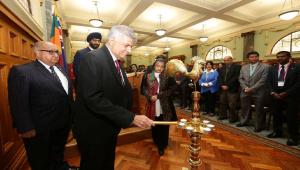
First let me express my sincere appreciation to the organizers of this event for the invitation extended to me. I am concluding my visit to New Zealand with this talk. I have noted the objective of the Institute is to promote discussion and understanding of international issues and emerging trends.
A new Global order is still emerging. It has been marked by the collapse of both the post-cold war order as well as the political dominance of the West. The emergence of strong regional powers is challenging the hegemony of the still predominant global actor, USA. The western world is in the process of re-examining its basic tenets. All of us have to focus on how we reposition ourselves. In that context, I am happy to be here today to address you on the theme of “Sri Lanka and its place in the world.”
Sri Lanka’s location in the heart of the Indian Ocean straddling Western and Eastern Asia has made us beneficiaries of inter-regional trade for centuries. The strategic importance of Sri Lanka as a regional hub in the realm of global commercial activity has been widely acknowledged.
Historical records show that Sri Lanka was called by more than sixty-eight names is a clear testimony of themany nations and peoples that communicated with this Island State through the centuries and its importance as a port of call.
In the ancient world, as far as global and navigational contexts were concerned, Sri Lanka possessed three strategic geographical advantages.
-It was the vital southern-most point of mainland Asia;
-It was almost on the Equator where navigational winds and monsoon effects changed directions;
-It was the half waypoint between the two great empires of Rome and China.
Even though navigational winds are no longer of relevance in the modern world, the geographical positioning of Sri Lanka still remains of consequence especially with the construction of the Suez Canal which provided a free passage between Europe and Asia.
Even as an internal self-governing colony under the British, Sri Lankan leaders had a clear focus on Asia and was well aware of the choices facing the international community. In January 1942, when the Allies stood at their most vulnerable moment, Sri Lanka re-affirmed its commitment to the Allies and extended all support to the United Nations. After gaining independence from the British in 1948, Sri Lanka advocated and acted on the need for an Asian focus. The Commonwealth Foreign Ministers’ meeting in Colombo, in 1950, which gave rise to the Colombo Plan was one such occasion.
Immediately after the World War II, Sri Lanka led the Asian nations in supporting the Peace Treaty with Japan at the San Francisco Conference in 1951. This was a high watermark in Sri Lanka’s foreign policy after independence and the foundation for Sri Lanka’s relations with Japan. The concept of a completely independent Japan was first put forward at the Colombo Conference of Commonwealth Foreign Ministers in 1950, where the issue was considered – not as an isolated case, but as part of the South and South East Asian region.
The independence of Sri Lanka’s foreign policy at the time was further emphasized by the Rubber-Rice Pact of 1952 that Sri Lanka entered into with the People’s Republic of China. We were not afraid to engage with countries based on our socio-economic needs.
The 1954 the Colombo Powers Meeting brought together the leaders of India, Pakistan, Myanmar, Indonesia and Sri Lanka, to work towards overcoming the issues of post-colonialism and to establish democracy and democratic institutions within these nations.
This in turn led to the Afro-Asian Conference in Bandung, in 1955 which was the precursor to the Non-Aligned Movement. Sri Lanka played an active role in the Non Aligned Movement, and was selected as its Chair following the NAM Summit held in Colombo in 1976.
Since the collapse of the Soviet Union and the end of both the Cold War and the post-Cold War era, there have been radical changes in the world order. Economic interest is increasingly driving national priorities and political affiliations. We must adjust to these evolving global priorities and realities.
On the other side of the Indian Ocean, the African continent is also going through political and economic transformations, which could complement its already significant economic growth. The African Union is becoming more relevant in the current global context where the trade and economy of its member States are becoming increasingly integrated with other regions. In recognition of this importance, Sri Lanka will be establishing a diplomatic mission at the seat of the African Union in Addis Ababa.
The turn of the millennium has also witnessed another important development. Unprecedented economic growth in Asia has shifted the world economic centre of gravity to the East since China has become the largest economy in the world, and while the US is 2nd, India, and Japan occupy 3rd and 4th places. Thus, new consumer markets in Asia and the expansion of the Asian middle class are changing the traditional focus of markets.
The ADB has predicted that Asia will account for half of all global economic output by 2050 if the current levels of growth are maintained.
While global power has generally manifested itself in the form of political and military influence, the current reality is that the scale of economic achievements and the strength of an economy underpin the weight of political, military and other influences of powerful nations.
With 2 billion population, South Asia is also a considerable market with growing significance. It is in this evolving context and dynamics of the globe that we in Sri Lanka have started to plan and project our own future.
In the coming decades, managing our relations with several centers of global power, many of which directly or indirectly would seek to expand influence in the Asian seas will no doubt be a major challenge. It is on leveraging our advantages effectively in the overlapping spheres of economic and strategic interests, that our success within the region and beyond, inter alia, will depend.
At the end of the internal conflict in Sri Lanka in 2009 we sought to isolate ourselves from emerging trends. In the 6 years following the end of this conflict, there was deliberate, continued rejection of efforts at improving the human rights situation and embarking on genuine reconciliation.
The National Unity Government established by President Maithripala Sirisena and myself have wholeheartedly taken on this challenge. On 8th January 2015, President Sirisena was elected the Executive President on a policy platform of good governance, rule of law and accountability, transparency, re-democratization and reconciliation. The Parliamentary elections held in August 2015 gave a clear mandate for the formation of a national Government to advance these goals and to consolidate the drive towards development, peace and freedom; thereby establishing a society free from corruption and fear.
Reconciliation is being advanced in a manner that is both inclusive and genuine. The different communities in Sri Lanka have to, first and foremost, be brought on an inclusive platform of mutual understanding and co-existence.
Sri Lanka is currently engaged in drafting a Constitution that strengthens and entrenches fundamental rights and freedoms – with more power to the people. By co-sponsoring the HRC Resolution 30/1 Sri Lanka has reasserted its commitment to human rights and willingness to work with international partners in addressing issues of concern, while at the same time rebuilding and strengthening relations within the international community. Focus on reconciliation is the new Government’s commitment to fostering national unity, which is essential if we are to strengthen domestic stability and resume our march to become a high income economy.
Overcoming internal contradictions through reconciliation and peace building in our view would empower the government and the people of Sri Lanka in their search for a significant role in the region and in the world.
Our Government is now refocusing attention on repositioning Sri Lanka’s place on the international stage, which was lost during the long years of conflict.
The global power transition to Asia creates both opportunities and challenges for Asia as whole and the Indian Ocean in particular. As noted earlier the paradigm shift in the balance of power affecting the countries of the Asian Oceans – the Indian Ocean and the Pacific Ocean proffer extraordinary opportunities to create something fresh in the global context and something historically and uniquely beneficial to its people.
Sri Lanka’s situation in the nautical corridor between the East and West is of import not only from a geostrategic perspective, but also from maritime economic and security perspectives. On the one hand, the Indian Ocean is a vast source of maritime economic resources, on the other, it is a maritime trading corridor through which nearly two thirds of the world’s oil is transported. Thus, the protection of the Indian Ocean is crucial for the energy, food and national security of many nations. This is where the location of Sri Lanka as a fulcrum of the Indian Ocean demands attention.
Consequently, let us devote a moment to the discussion of the nature of big power rivalry in the Indian Ocean. It is important that we grasp the difference between the power dynamics of the Pacific and the Indian oceans. The Pacific is intrinsic to US Security and therefore has its own power play and strategic spectrum of political interests.
In contrast, the Indian Ocean Region has maintained a multipolar characteristic by entering into partnerships with countries outside the region. The littoral states in the region have always resisted the domination of the Indian Ocean by any single entity.
Therefore it is important that we limit the disputes in the Pacific Ocean from reaching the Indian Ocean. Yet, it is vital that we strengthen political and economic cooperation with East Asian and Pacific countries including New Zealand.
Already our two nations are committed to cooperation in combatting people smuggling, trafficking persons, transnational crimes, terrorism and illegal fishing and other similar security issues in both Asia and the Pacific.
While it could well be that a single Indo-Pacific Region for military security will have the potential to increase the likelihood of such rivalry spilling over to the Indian Ocean. A new initiative, on the other hand, that would ensure freedom of navigation in the Indian Ocean will help to reduce the potential for such disputes. This is why a few weeks back in a speech delivered in Singapore, I proposed that SAARC and ASEAN get together to revitalize talks on the freedom of navigation.
Sri Lanka is prepared to play a responsible role jointly with other nations towards ensuring the freedom of navigation from Maldives to the Malacca straits. It is vital to adopt an inclusive approach that invites all stakeholders to discussions concerning the freedom of navigation in the Indian Ocean.
We are also prepared to develop our Naval and Air Forces to fulfill our role in this regard.
In our perspective, the Indian Ocean remains key to Asian prosperity. An Indian Ocean order, which envisages at its core an ocean free of conflict despite competing economic interests – with lanes of communication, ease and safety of passage, secure and sustainable use of resources for the economic advancement of States in an equitable manner, is imperative.
South Asia Association for Regional Cooperation (SAARC) was established to promote peace, amity and progress in the region by complementing bilateral and multi lateral cooperation. SAARC’s main function is to be a platform for dialogue at the heads of Government level contributing to the improvement of bilateral relations among members.
Sri Lanka’s request at the inception of SAARC in 1985, to include cross border terrorism was rejected. At the time, this was considered to be a bilateral issue. Today, cross border terrorism has gatecrashed the SAARC summit. The recent terrorist attack on the Indian military base in Uri resulted in four member states stating their inability to attend the Islamabad Summit meeting in November this year. Sri Lanka which is opposed to terrorism in all its form of manifestation, condemned this incident and has expressed regret that the prevailing environment does not permit the meeting.
Yet if SAARC is to play a useful role, the annual summit meetings at heads of Government level must take place. Therefore, this postponement must be utilized by the member countries to reflect on the question of cross border terrorism. The future of the SAARC depends on an outcome acceptable to all members. If not, SAARC’s days are numbered. Then, Sri Lanka will have to look for other options. The future – like in the past will depend on the ocean.
The security and stability of the Indian Ocean is a pre-requisite to enable legitimate economic activity to preserve the maritime environment and seabed. These geo-political realities require that Sri Lanka build strong bilateral relations with its fellow South Asian members and the Bay of Bengal members of ASEAN. The security of the Indian Ocean is a pre-requisite to achieve our economic objectives.
Our government is also repositioning ourselves to maximise on our bilateral our relationships with both our historic and new trading partners. It must be not be forgotten that Sri Lanka’s geo-strategic position makes us a hub of the Indian Ocean as well as a transshipment port for the Bay of Bengal trade. To fully tap this potential,Sri Lanka will engage in initiatives with regional players who have major economic stakes in the Indian Ocean.
The India-Sri Lanka Free Trade Agreement (FTA) between the two countries will be further expanded and deepened to go beyond trading goods to cover trade in services, investments and technology cooperation. The Governments of India and Sri Lanka hope to finalize an Economic Technology Cooperation Agreement (ETCA) by 2017. The ETCA will enhance the scope of our existing economic partnership agreement to extend freer movement of goods and services with the added emphasis of cooperation in the development of technology. ETCA will provide an impetus to the existing synergies and has the potential to promote a rapid growth of the sub regional economy between Sri Lanka and the five South Indian states, which today accounts for US Dollars 500 billion.
We are also negotiating a Free Trade Agreement (FTA) with Singapore. Singapore already has a Comprehensive Economic Partnership Agreement (CEPA) with India. Therefore, we believe that by next year the Singapore-India (CEPA), the Indo-Lanka ETCA and the Sri Lanka-Singapore FTA will enable the southern sub region of South Asia and Singapore to establish a tripartite arrangement for trade and investments.
Historically Sri Lanka played a major role in the Maritime Silk Route. Therefore we are supporting the One Belt – One Road economic initiative. This will consolidate our position as the Hub of the Indian Ocean while further integrating us with the Asian markets. We are also negotiating a FTA with China as a part of this initiative. The Chinese investments will be primarily directed to:
- Industrialisation and further development of Hambantota Air Sea Hub in southern Sri Lanka and
- The creation of a Financial City to fill the vacuum for offshore financial service between Singapore and Dubai.
These programmes have no military implications.
The economic cooperation between Japan and Sri Lanka is as important to us as the above mentioned FTAs. We are grateful that four decades of Japanese donor assistance has made a significant impact on our economic and social developments. The two countries are now holding discussions for further closer economic cooperation programme.
We have already made the application to the European Union to regain the GSP+ facility for preferential access to the single market and are hopeful of an agreement by next year. All these abovementioned measures are a pre-requisite for the Indian Ocean Hub.
Sri Lanka will also institute Free Trade Agreements with the other Bay of Bengal countries such as Thailand, Malaysia and Indonesia. Similar attention will also be paid to the Western Indian Ocean countries.
For centuries Sri Lanka has had close ties with the West Asian Muslim countries and we are already undertaking talks to further strengthen our economic ties and trade ties with them.
Sri Lanka is also looking forward to strengthening its trade relations both with UK and US, which we have enjoyed since independence. But this however will depend on the following factors:
- The outcome of the US Presidential and Congressional Elections of 2016;
- Negotiations between UK and European Union on Brexit.
Since 2010 Russia has begun to re-assert its economic and political power prioritizing its interests – expanding its global reach and its strategic importance. This is in another sphere in which Sri Lanka has to strengthen economic relations.
My speech will not be complete without speaking of Sri Lanka’s relationship with New Zealand. Both are small islands, both live next to large neighbours, both have educated populations, both exist on agricultural economies which are diversifying into other sectors. Both play cricket and rugby. We have followed your lead in formulating enlightened social policies. Our Parliament is currently discussing the adoption of New Zealand’s Mixed Member Proportion election system.
Next, I would like to refer to specific institutions to which both our countries belong and how we could, together, broaden their mandates.
The Commonwealth Charter which was adopted after UK joined the European Common Market promotes the “values and aspirations” of democracy, human rights and the rule of law. Understandably at that time there was no focus on trade. However, Intra Commonwealth trade has grown over the years, projected to surpass US $ 1 trillion by 2020. However, the full potential of trade remains yet to be fully tapped.
The Commonwealth economy is growing three times faster than the EU economy and faster than the world average. Over 2/3 of its population will be within the Sri Lankan hub of touching Africa on the one side of the Indian Ocean and Australia – New Zealand on the other side.
The Kotte Statement on International Trade and Investment adopted by CHOGM 2013 held in Colombo states: “we recognize the potential for growth in intra commonwealth trade and investment as well as the importance of promoting practical measures to overcome constraints to such growth”.
Therefore this is an appropriate time when UK is seeking a new role to give effect to the Kotte Statement by promoting a Commonwealth Framework for Trade and Investment.
********
In the six decades of the Colombo Plan of which our two countries were founder members, the role of the state in the economy has shrunk, making way for free market private enterprises, which are fast becoming a part of the Global Value Chain.
We should create space in the Colombo Plan to promote and strengthen the emerging private enterprises in Asia – Pacific with special emphasis on innovation. This will also require the support from regional financial institutions, including ADB, AIIB, World Bank, JBIC etc.
We both work within the system of international institution with its numerous shortcomings. Sri Lanka like New Zealand have always believed and worked within the UN system. Sri Lanka and New Zealand are strong supporters of the UN Multilateral system, which underpins the policy of small states to promote and preserve their interests. We wish Helen Clark, a friend, all the best in her endeavours to become the Secretary General of the United Nations.
Therefore, there are many areas in which we can work together to further promote UN ideals and objectives especially that of inclusive and sustainable development. Both our countries are high on the UN development index. Sri Lanka has already surpassed regional figures. Therefore we should coordinate efforts to ensure that UN members achieve the 17 goals of UN sustainable development. The other is cooperating and ensuring the successful implementation of the Paris Climate Change Agreement.
The Government of Sri Lanka has a clear vision of what it wants Sri Lanka to be in the world today. As multi-ethnic island nation with a Commonwealth heritage and commitment to the global multilateral system we view New Zealand as a partner on whom we can count on for advice and guidance. Today, Sri Lanka is at an important juncture – faced with historic opportunities and key decisions to make in the political and economic domains at a time when the global political and economic order is also undergoing a radical transformation. Therefore we will seize this opportunity and reposition ourselves to make a meaningful contribution to the international system.
Joint Statement by New Zealand and Sri Lanka on the Occasion of the Official Visit to New Zealand by the Prime Minister of Sri Lanka Hon. Ranil Wickremesinghe, 1-3 October 2016
October 3, 2016
At the invitation of Rt. Hon John Key, Prime Minister of New Zealand, Hon. Ranil Wickremesinghe, Prime Minister of the Democratic Socialist Republic of Sri Lanka, is paying an official visit to New Zealand from 1-3 October 2016, accompanied by Hon. Sagala Ratnayaka, Minister of Law and Order and Southern Development; Hon. Harin Fernando, Minister of Telecommunication and Digital Infrastructure; Hon. Dr. Sudarshini Fernandopulle, State Minister of City Planning and Water Supply; and Hon. Dr. Harsha de Silva, Deputy Minister of Foreign Affairs.
- Prime Minister Wickremesinghe’s visit reciprocates a visit by Prime Minister Key to Sri Lanka in February 2016. The two Prime Ministers released this joint statement following official talks at Government House on 1 October in Auckland.
- Having welcomed the deepening of the New Zealand–Sri Lanka relationship, the two leaders reaffirmed their commitment to further enhance bilateral relations in the years ahead. The two leaders noted that the reciprocal Prime Ministerial visits in 2016 reflected the importance that both countries placed on their bilateral relations. In this regard, the two leaders agreed to facilitate the holding of regular meetings at the political and senior officials’ levels, including the commencement of Foreign Ministry Consultations.
- Prime Minister Key and Prime Minister Wickremesinghe expressed their happiness on the progress made on the opening of resident High Commissions in Wellington and Colombo in the near future
- The two Prime Ministers underscored the desire of the Governments of New Zealand and Sri Lanka to further strengthen the bilateral commercial and trade ties, including investment promotion between the two countries. The two leaders noted the potential for trading in quality products such as Sri Lankan tea and cinnamon and New Zealand dairy products. During the visit, Prime Minister Wickremesinghe will deliver a speech at an event hosted by the Sri Lanka New Zealand Business Council in Auckland to encourage greater New Zealand commercial interest in Sri Lanka.
- The two Prime Ministers noted that agricultural cooperation was an important component of the bilateral commercial relationship. Prime Minister Wickremesinghe welcomed the role that New Zealand’s dairy industry has played in Sri Lanka for around half a century. In this regard, Prime Minister Wickremesinghe was pleased to be meeting with Hon Nathan Guy, Minister for Primary Industries, and experience first-hand New Zealand’s leading agricultural technology and approach towards dairy farming by visiting relevant plants and farms in Waikato. The Prime Ministers reaffirmed the importance of the bilateral Dairy Cooperation Arrangement between New Zealand and Sri Lanka and announced the trial of Farm IQ technology being provided to Sri Lankan farmers by the New Zealand Ministry for Primary Industries.
- Prime Minister Key welcomed the progress that Sri Lanka had made since his visit to Colombo in February 2016 in reducing dairy tariffs and thanked Prime Minister Wickremesinghe for his leadership in this area. The Prime Ministers discussed the further steps that Sri Lanka planned to take in the period ahead toward full compliance with WTO tariff rates. The Prime Ministers discussed the consequences of Brexit for New Zealand and Sri Lanka and the broader importance of trade liberalisation and the effective functioning of the WTO rules-based trading system. Prime Minister Wickremesinghe described the potential for Commonwealth countries to have more regular discussions on trade and economic issues, as outlined in the ‘Kotte Statement on International Trade and Investment’, 2013.
- The two Prime Ministers noted that both countries shared many similarities, being multi-ethnic island nations with a Commonwealth heritage, and as strong supporters of the global multilateral system which underpinned the ability of small states to promote and preserve their interests. Prime Minister Wickremesinghe expressed appreciation for New Zealand’s important contribution as a non-permanent member of the United Nations Security Council. With regard to the candidature of Helen Clark for the post of the Secretary-General of the United Nations, Prime Minister Wickremesinghe wished her success.
- Prime Minister Key welcomed the Government of Sri Lanka’s continued progress in national reconciliation, including through constitutional reform. Prime Minister Key reiterated New Zealand’s willingness to provide practical support. Prime Minister Key also commended the Sri Lankan Government’s active engagement in regional and international fora. During his visit, Prime Minister Wickremesinghe will deliver a speech on “Sri Lanka’s Place in the World” at an event hosted by the Asia New Zealand Foundation at the Parliament in Wellington.
- The two leaders also noted the contribution made by tourists, students and approximately 12,000 Sri Lankans settled in New Zealand towards strengthening relations between the two countries.
- Prime Minister Key welcomed the ongoing cooperation between Sri Lanka and New Zealand in the areas of animal health and conservation. The two Prime Ministers also noted their governments’ shared commitment to the conservation of their native flora and fauna and to animal welfare. Prime Minister Wickremesinghe will visit Auckland Zoo, which houses the Sri Lankan elephant “Anjalee”, as well as the Zealandia Ecosanctuary in Wellington. Accompanied by the New Zealand Conservation Minister Maggie Barry, the Zealandia visit will provide an opportunity for Prime Minister Wickremesinghe to learn more about New Zealand’s approach to conservation.
- Prime Ministers Key and Wickremesinghe noted the shared love of sports between New Zealanders and Sri Lankans, especially in cricket and They welcomed current bilateral cooperation in rugby development, with New Zealand Rugby delivering coaching skills and standards workshops in Sri Lanka this month, and hosting Sri Lankan coaches in New Zealand for training courses in late 2016.
- Prime Minister Wickremesinghe thanked Prime Minister Key and the Government and people of New Zealand for the generous hospitality afforded during his official visit.
Register with the High Commission
The Sri Lankan High Commission in Canberra would like to keep in touch with Sri Lankans and persons of Sri Lankan origin living in Australia, New Zealand, Fiji, Papua New Guinea, Vanuatu and other Pacific Islands as well as Sri Lankan community organisations in those countries.
If you are a current/former Sri Lankan or an office bearer of a Sri Lankan community organisation we invite you to register with the High Commission.
RegisterAddress
Sri Lanka High Commission
61, Hampton Circuit
Yarralumla
ACT 2600

